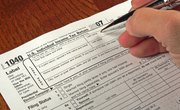
Even if you’re paid under the table with cash, you can be certain the IRS expects its cut. While there are income thresholds in place that determine at which point you must file, it is still a good idea to file taxes even if you aren’t required to do so – you may be eligible for certain tax credits and deductions. Generally, self-employed taxpayers and independent contractors receive 1099s for non-salaried work. But, if you receive income under the table from odd jobs or tips, you may still be required to file income taxes, even without a 1099.
Tips
If you have received cash as a form of payment for your work, you are required to report it to the IRS. You can use IRS Form 1040 or 1040-SR to accurately report your cash income. If this money was not reported to your employer, such as a scenario in which you earned cash tips, you should report these funds using IRS Form 4137.
Must I Report Income from Under the Table Jobs?
The short answer is yes. Depending upon the source of your under the table income, you will have to fill out Form 1040EZ or Form 1040A for taxes before 2018 or the revised Form 1040 for 2018 and onwards.Which form you use is determined by your individual tax situation. You may also need to file Form 4137 to report any income you’ve received from working such as tips, that was not reported to your employer. If you’re unsure of exactly which form to file at tax time, consulting with a tax professional, or the IRS’ website, is recommended.
Who Is Required to File?
Under the table income is basically any income that you are paid for services rendered, but was not reported to the IRS by the person paying you. Employers must report and pay taxes on income paid to workers. If they fail to do so, you’re still on the hook with the IRS even though paying employees cash under the table is a crime. Under the table jobs include babysitting, yard work or bartending, and are typically jobs that pay cash.
Because all monies paid to you for any work you complete is considered income, if the amount earned falls within certain thresholds, you must report it on your taxes – even if you’re not supplied with a 1099.
For 2017 taxes, filed in 2018:
- Single filers under the age of 65 must file taxes when their gross income reaches $10,400 or more, and for single filers age 65 and older, the figure is $11,950.
- Married filing jointly taxpayers need to file once their income exceeds $20,800 if both spouses are under 65 years of age. If one spouse is under 65, and the other is 65 or older, this threshold is $22,050, while filers who are both age 65 or older have to file taxes when their income exceeds $23,300.
- Married filing separately couples must file when $4,050 in income is earned regardless of either spouse's age.
- Wage earners filing as head of household are required to file taxes at $13,400 in income under age 65, and $14,950 at age 65 and older.
- A qualifying widow(er) with a dependent child has to file taxes at $16,750 if under age 65, and $18,000 if age 65 or older.
For the 2018 tax season, filed in 2019, the personal exemption has been eliminated, but the standard deduction has increased. This means that:
- Single filers, regardless of age, must file a tax return when their gross income exceeds $12,000.
- For married couples filing a joint return, income over $24,000 must be declared.
- Head of household filers that earn more than $18,000 are required to file and those filers who are married but file separately must file if their income is over $12,000.
For the 2019 tax season, filed in 2020:
- Single filers under age 65 must file a tax return when their gross income exceeds $12,200. Single filers age 65 or older must file when their income exceeds $13,850.
- For married couples filing jointly, income over $24,400 must be reported if both spouses are under age 65. If one spouse is 65 or older while the other is not, the threshold is $25,700. If both are age 65 or older, the threshold is $27,000.
- For married couples filing separately, income over $5 must be reported regardless of age.
- Head of household filers that earn income over $18,350 must file if they are under age 65. If age 65 or older, they must file if they earn over $20,000.
- Qualifying widow(er)s with a dependent child must file with income over $24,400 if under age 65 and must file with income over $25,700 if age 65 or older.
There are no exceptions to the earned income, even if you were working under the table. If you meet the income threshold, the IRS expects you to file a tax return.
Am I Considered Self-Employed?
Self-employed, contract and freelance workers are also sometimes paid under the table for work they’ve completed. The rules for self-employed workers differ from those who are considered employees. Employees have taxes withheld from their paychecks by employers, while self-employed wage earners do not; they are responsible for paying these taxes themselves.
If you’re self-employed, the income threshold at which you must file taxes is much lower. After earning more than $400 as self-employed, you are required to file an income tax return with the IRS. Self-employed individuals have more autonomy over how their job is performed, how much financial responsibility they have for their work and what relationship they have with the business.
Read More: What Happens If You Don't File Taxes?
Tips
If you shoulder the bulk of the responsibility for the day-to-day operations of completing your job, then the chances are good that you are considered self-employed.
References
- H&R Block: How much do you have to make to file taxes — What is the minimum income to file taxes?
- Efile: Income Taxes for Self-Employed Business Owners and Independent Contractors
- TurboTax: TurboTax / Tax Calculators & Tips / Tax Tips Guides & Videos / IRS Tax Forms / When to Use Tax Form 4137: Tax on Unreported Tip Income When to Use Tax Form 4137: Tax on Unreported Tip Income
- 1040.com: Which Tax Form to File
- IRS: About Form 1099-MISC, Miscellaneous Income
- IRS: About Form 1040, U.S. Individual Income Tax Return
- IRS: About Form 4137, Social Security and Medicare Tax on Unreported Tip Income
- IRS: About Form 1040-EZ, Income Tax Return for Single and Joint Filers With No Dependents
- Internal Revenue Service. "1040 Instructions (2019)." Accessed Oct. 16, 2020.
- Internal Revenue Service. "1040 Instructions (2019)." Accessed Oct. 16, 2020.
Writer Bio
Tara Thomas is a Los Angeles-based writer and avid world traveler. Her articles appear in various online publications, including Sapling, PocketSense, Zacks, Livestrong, Modern Mom and SF Gate. Thomas has a Bachelor of Science in marine biology from California State University, Long Beach and spent 10 years as a mortgage consultant.
